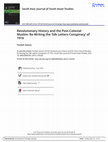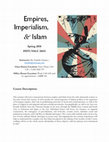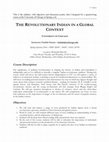Publications by Faridah Zaman

Modern Intellectual History, 2018
Full article accessible without log-in via
https://www.cambridge.org/core/journals/modern-intell... more Full article accessible without log-in via
https://www.cambridge.org/core/journals/modern-intellectual-history/article/future-of-islam-16721924/3790D12997E969770B3377018062981B/share/2f1f3fee5c30c49192779ff8efa29eb937669799
This article examines the ways in which defining the character of early Islam has been instrumental to contemporary political debates at distinct moments in time. It looks in particular at Restoration-era England and the last decades of the Ottoman Caliphate. In the latter period, European and Muslim scholars alike reappraised Islamic history in the context of the often polemical discourse surrounding pan-Islamism and the future of Islam. Indian Muslim writers especially moved into new and inventive historical territory. They took up the vocabulary of modern politics in their histories and in doing so pluralized the heritage of certain ideas and concepts, including democracy, constitutionalism, republicanism, and socialism. The result was the articulation of a usable, progressive Islamic past.
Journal of the Royal Asiatic Society, 2017
This article begins with the premise that while nostalgia haunts histories of Indian Muslim cultu... more This article begins with the premise that while nostalgia haunts histories of Indian Muslim cultural and social life, it remains curiously underspecified with relation to Muslim political life. By looking at the figure of Mohamed Ali Jauhar (1878–1931) and a constellation of transnational initiatives around the year 1913 in particular, it suggests ways in which we might redeploy nostalgia in order to look for temporal and spatial ambivalence in historical moments. In turn, that ambivalence points to the limitations of understanding nostalgia as purely a longing for another place and a past time.

South Asia: Journal of South Asian Studies, Jul 2016
This article takes the ‘Silk Letters Conspiracy’, a complex, transnational scheme uncovered by Br... more This article takes the ‘Silk Letters Conspiracy’, a complex, transnational scheme uncovered by British colonial officials in 1916, as the starting point for a discussion on the writing of revolutionary histories in post-colonial India. It considers the generally vexed position of Muslims in histories of early twentieth-century anti-colonialism and the lengths to which some scholars, particularly those associated with the Dar al-ʿUlum Deoband seminary in northern India, have gone in order to create a counter-narrative of Muslim revolutionary anti-colonialism that was fully in keeping with the broader nationalist struggle. Later, the paper speculates on whether other historical lives, such as that of Abul Kalam Azad, one of the most high-profile Muslims in the leadership of the Indian National Congress in the 1940s and 1950s, could also be so re-inscribed and made part of the revolutionary script of the 1910s, and to what end this might be done. Throughout, this article meditates on the problematic nature of testimony, memory and the colonial archive.

Journal of Asian Studies, Mar 2015
This article rethinks the complicated encounter between the East India Company and the built heri... more This article rethinks the complicated encounter between the East India Company and the built heritage of India in the early nineteenth century. Through an extended case study of the imperial mosque in Allahabad, which was periodically subject to British intervention over some sixty years, it traces vicissitudes in attitudes towards history, religion, and the social existence of Muslims in India generally and Allahabad in particular. The article argues for the need to look beyond the narrative of Britain's relationship with architecture as artefact or heritage—a relationship that took on institutional form in the 1860s—to the comparatively less familiar story of the Company State's prolonged and serious interest in the built environment, and specifically religious buildings, as part of the political economy of its rule. It demonstrates that such an interest was simultaneously a logical outcome of and a tension within the legitimating discourses that the Company State fashioned during the last half-century of its rule in India.
Book Reviews by Faridah Zaman
Teaching Documents by Faridah Zaman

This seminar will survey interactions between empires and Islam from the early nineteenth century... more This seminar will survey interactions between empires and Islam from the early nineteenth century to the early twenty-first century. It will consider the varied responses of Islamic polities to the expansion of European empires, their role in proliferating networks of travel and communication, as well as the place of religion in anti-imperial and anti-colonial movements. Geographically, we will cover Asia very broadly defined: from the Ottoman Empire in the west, through the Middle East, Central and South Asia, to Indonesia and Japan to the east. Individual classes will focus, for instance, on imperial connections, the emergence of pan-Islamism, sufi networks, oceanic travel, subaltern social and political movements, and Cold War era Muslim ideologues. The course will conclude with a look at the rise of more militant Islamic ideologies in recent years. Investigating this two-century long history will help us understand the complex role that Islam has played in the making of the modern world. Course readings will be on the whole recent scholarship on these subjects, with key primary texts introduced in class.

The significance of political revolutionaries in the history of Indian anti-colonialism is indisp... more The significance of political revolutionaries in the history of Indian anti-colonialism is indisputable and yet it is difficult to describe a singular 'Indian revolutionary tradition'. During this course, which will survey the half-century before independence in 1947, we will explore a variety of radical or revolutionary politics, searching as much for intellectual disjuncture as commonalities. We will focus on reading personal narratives that demonstrate the ways in which key figures thought and wrote about their journeys towards a political identity – reading, for instance, M. K. Gandhi's revolt against history and liberalism, Hind Swaraj; Lala Har Dayal's memoirs of his world-crossing revolutionary circuits; and the young revolutionary self that emerges from Bhagat Singh's Jail Notebook. We will pay attention throughout to themes of violence, travel, and the often-times ambivalent relationship between revolutionaries and the nation. We will complement our focus on texts with reflection on the importance of images of the revolutionary and the nature of popular memory in the Indian context.
Workshops Convened by Faridah Zaman
This one-day workshop at the University of Chicago brings together a range of scholars to discuss... more This one-day workshop at the University of Chicago brings together a range of scholars to discuss issues broadly related to historical writing, memory, myth and oral traditions, the construction of intellectual and cultural narratives of origin and belonging, and the making of ‘useable pasts’ for purposes that are political or otherwise in twentieth-century South Asia.
The question of appropriations and misappropriations is ever-timely in contemporary South Asia. On the one hand the political stakes of contested historical narratives have never been higher, and on the other, the sites of contestation have never been so varied. Over the course of this workshop the organizers hope to stimulate a discussion that particularly foregrounds the ways that non-state actors have negotiated and pluralized the past over the span of the last century.
Thesis Abstract by Faridah Zaman
This thesis looks at a group of Muslim journalists, theologians, poets and political activists du... more This thesis looks at a group of Muslim journalists, theologians, poets and political activists during India's eventful advent into the twentieth century. It uses their writings and their actions to reconstruct a sense of their worldview -in particular their ideas about political action in a period of immense change in the global order. This loosely configured group had, the thesis argues, a sharpened sense of the demands of the age and was consequently uniquely mobile, imaginative, interested in the potentialities of youth, and open to various kinds of 'revolutionary' activity. In sum, the thesis finds these figures -each of them among the most important figures of early twentieth century Indian history -to be pursuing a politics that depended on a novel understanding of the future as an open field of action.

Uploads
Publications by Faridah Zaman
https://www.cambridge.org/core/journals/modern-intellectual-history/article/future-of-islam-16721924/3790D12997E969770B3377018062981B/share/2f1f3fee5c30c49192779ff8efa29eb937669799
This article examines the ways in which defining the character of early Islam has been instrumental to contemporary political debates at distinct moments in time. It looks in particular at Restoration-era England and the last decades of the Ottoman Caliphate. In the latter period, European and Muslim scholars alike reappraised Islamic history in the context of the often polemical discourse surrounding pan-Islamism and the future of Islam. Indian Muslim writers especially moved into new and inventive historical territory. They took up the vocabulary of modern politics in their histories and in doing so pluralized the heritage of certain ideas and concepts, including democracy, constitutionalism, republicanism, and socialism. The result was the articulation of a usable, progressive Islamic past.
Book Reviews by Faridah Zaman
Teaching Documents by Faridah Zaman
Workshops Convened by Faridah Zaman
The question of appropriations and misappropriations is ever-timely in contemporary South Asia. On the one hand the political stakes of contested historical narratives have never been higher, and on the other, the sites of contestation have never been so varied. Over the course of this workshop the organizers hope to stimulate a discussion that particularly foregrounds the ways that non-state actors have negotiated and pluralized the past over the span of the last century.
Thesis Abstract by Faridah Zaman
https://www.cambridge.org/core/journals/modern-intellectual-history/article/future-of-islam-16721924/3790D12997E969770B3377018062981B/share/2f1f3fee5c30c49192779ff8efa29eb937669799
This article examines the ways in which defining the character of early Islam has been instrumental to contemporary political debates at distinct moments in time. It looks in particular at Restoration-era England and the last decades of the Ottoman Caliphate. In the latter period, European and Muslim scholars alike reappraised Islamic history in the context of the often polemical discourse surrounding pan-Islamism and the future of Islam. Indian Muslim writers especially moved into new and inventive historical territory. They took up the vocabulary of modern politics in their histories and in doing so pluralized the heritage of certain ideas and concepts, including democracy, constitutionalism, republicanism, and socialism. The result was the articulation of a usable, progressive Islamic past.
The question of appropriations and misappropriations is ever-timely in contemporary South Asia. On the one hand the political stakes of contested historical narratives have never been higher, and on the other, the sites of contestation have never been so varied. Over the course of this workshop the organizers hope to stimulate a discussion that particularly foregrounds the ways that non-state actors have negotiated and pluralized the past over the span of the last century.